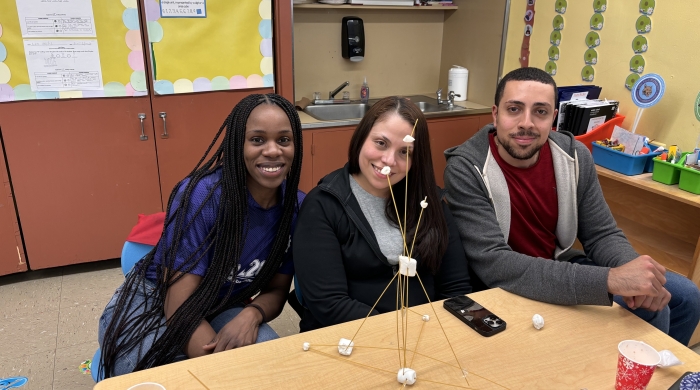On September 24th, NYU's Peace Research and Education Program (PREP) hosted an event that brought together experts from diverse fields to explore the intersection of artificial intelligence, global development, and peacebuilding.
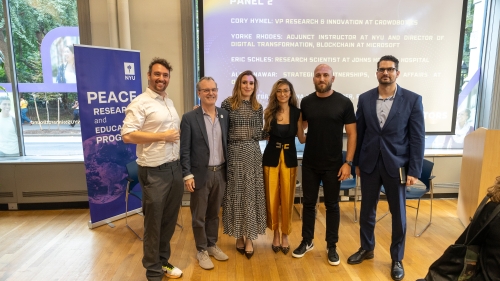
This collaborative effort, spearheaded by PREP researcher Marine Ragnet and Becera founder Christina Nemr, showcased the potential for innovative approaches in conflict transformation and humanitarian aid. The event, "AI Across Sectors: Breaking Silos, Building Bridges," featured representatives from a wide array of organizations, including the United Nations University Centre for Policy Research, the American Red Cross, Human Rights First, The GovLab, UN OCHA, UN Women, Crowdbotics, Microsoft, Johns Hopkins Hospital, and OpenAI. As part of PREP's ongoing commitment to bridging academic research with practical applications, the discussions illuminated new pathways for leveraging AI in some of the world's most pressing challenges.
The discussions unveiled several concepts that could revolutionize our approach to humanitarian action and peacebuilding. Deliberative AI emerged as an innovative approach aimed at enhancing community engagement in peace processes. This technology uses AI algorithms to facilitate and analyze large-scale public consultations, synthesizing diverse opinions and identifying areas of consensus and disagreement. This technology has the potential to amplify marginalized voices, facilitate more inclusive dialogues, and ultimately lead to more sustainable and locally-owned peace agreements. By leveraging AI to process and synthesize diverse perspectives, we may be able to uncover common ground in even the most polarized conflicts.
Alongside this, a new paradigm of ethical data stewardship is taking shape, reimagining data rights and consent in humanitarian settings with an emphasis on community values and expectations. This shift recognizes the unique vulnerabilities of populations in conflict zones and seeks to ensure that AI applications do not inadvertently exacerbate existing inequalities or create new ones. The concept of "social license" for data use emerged as a critical consideration, moving beyond individual consent to encompass broader community acceptance and benefit.
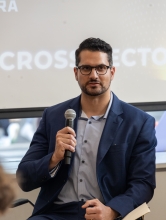
The event also highlighted AI's potential in anticipatory humanitarian action, offering new horizons in crisis prevention and mitigation. Predictive models powered by AI could revolutionize how we prepare for and respond to humanitarian crises, from natural disasters to forced displacement. By anticipating these crises, we can proactively engage in conflict prevention. For instance, AI-driven early warning systems can help identify potential flashpoints for violence, allowing peacebuilders to intervene before tensions escalate into full-blown conflicts. However, participants emphasized the importance of balancing technological insights with human expertise and local knowledge. The goal is not to replace human decision-making but to enhance it, providing decision-makers with more comprehensive and timely information.
A crucial theme that emerged during the discussions was the necessity of asking critical questions before implementing AI solutions in humanitarian and peacebuilding contexts. Participants stressed the importance of first clearly defining the problem at hand and then considering whether AI is truly the most appropriate tool to address it. This approach encourages practitioners to examine the root causes of issues, assess existing non-AI solutions, and carefully weigh the potential benefits against the risks of AI deployment. By fostering a culture of critical inquiry, the sector can ensure that AI is used judiciously and effectively, rather than being seen as a panacea for all challenges.
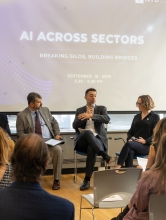
A key theme that resonated throughout the event was the critical need to adapt AI solutions to the unique challenges of peacebuilding and humanitarian work. Unlike in some commercial sectors, AI applications in these fields often need to function in low-resource, high-stakes environments where the consequences of failure can be severe. Participants emphasized the importance of developing AI tools that can operate effectively in resource-constrained settings, a crucial factor for their widespread adoption in the field. This might involve creating lightweight algorithms that can run on basic hardware or developing systems that can function with limited connectivity. Additionally, the discussion touched on the importance of sharing computing resources required to run AI platforms, exploring collaborative models that could make advanced AI capabilities more accessible to humanitarian organizations with limited technological infrastructure. Furthermore, participants highlighted the need to balance the environmental impact of operating AI systems with their potential peace outcomes, emphasizing the importance of sustainable AI solutions in peacebuilding efforts.
The concept of human-centered design was repeatedly emphasized, ensuring that AI remains a "humble collaborator" rather than a replacement for human judgment, particularly in complex conflict situations. This approach recognizes that while AI can process vast amounts of data and identify patterns, the nuanced understanding of cultural contexts, historical grievances, and local power dynamics remains a uniquely human capability. The discussions aligned with ongoing research in the field, including work by PREP, which emphasizes the importance of participatory approaches in AI governance and the need to involve affected communities in the design and implementation processes. The most promising solutions, it was noted, emerge from partnerships that bridge the technology sector with humanitarian and peacebuilding expertise, combining technical innovation with deep contextual understanding.
Emerging Strategic Priorities
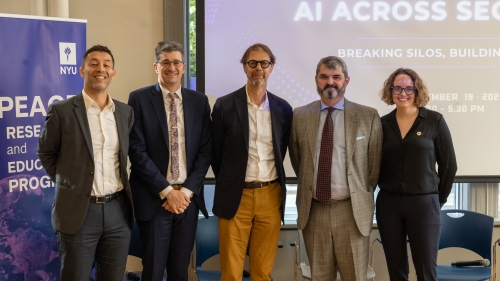
As we stand at this intersection of technology and peacebuilding, several strategic priorities emerge. There is a pressing need to develop ethical frameworks for AI governance in conflict-affected regions. These frameworks must be flexible enough to account for diverse cultural contexts while establishing clear guidelines for responsible AI use. The potential applications of deliberative AI in peace negotiations and community engagement warrant further exploration, with pilot projects needed to demonstrate efficacy and identify best practices.
Fostering partnerships to create context-appropriate AI tools for humanitarian actors remains crucial. This involves not only technical collaboration but also capacity building within humanitarian organizations to effectively leverage AI technologies. Additionally, advancing research on responsible data practices in sensitive environments is essential to ensure that technological advancements do not inadvertently harm vulnerable populations. This includes developing robust data protection protocols and exploring innovative approaches to data minimization and anonymization.
The insights from this event underscore the transformative potential of AI in addressing global challenges. However, realizing this potential requires a concerted effort from researchers, practitioners, policymakers, and technologists. By fostering ongoing dialogue and collaboration across sectors, we can harness the power of AI to build more just, peaceful, and resilient communities worldwide. This collaboration must be truly global, ensuring that voices from the Global South are central to shaping the future of AI in peacebuilding.
This blog post was inspired by the "AI Across Sectors: Breaking Silos, Building Bridges" event hosted by the NYU Peace Research and Education Program 24th, 2024.
How to Build Strong Family-School Partnerships
Building strong partnerships between families and schools is essential for fostering a consistent and supportive learning environment for students. In this blog post, Christine Park shares key strategies for creating a welcoming and collaborative relationship with families, and how to sustain these partnerships throughout the school year.
Top 10 Tips for Starting the School Year Strong
The beginning of the school year is a crucial time for teachers to set the tone for a successful academic year and journey, for students, families, school staff, and themselves. Check out our top 10 tips for starting the school year strong!
Beyond the Data: Humanizing Research through Photography
Photographing communities, particularly low income neighborhoods that are too often associated with negative stereotypes, come with the added responsibility of telling their authentic stories with compassion, strength, and beauty. In this blog, Hira Hasson pairs street photography with research to bring a new dimension to traditional research projects.




